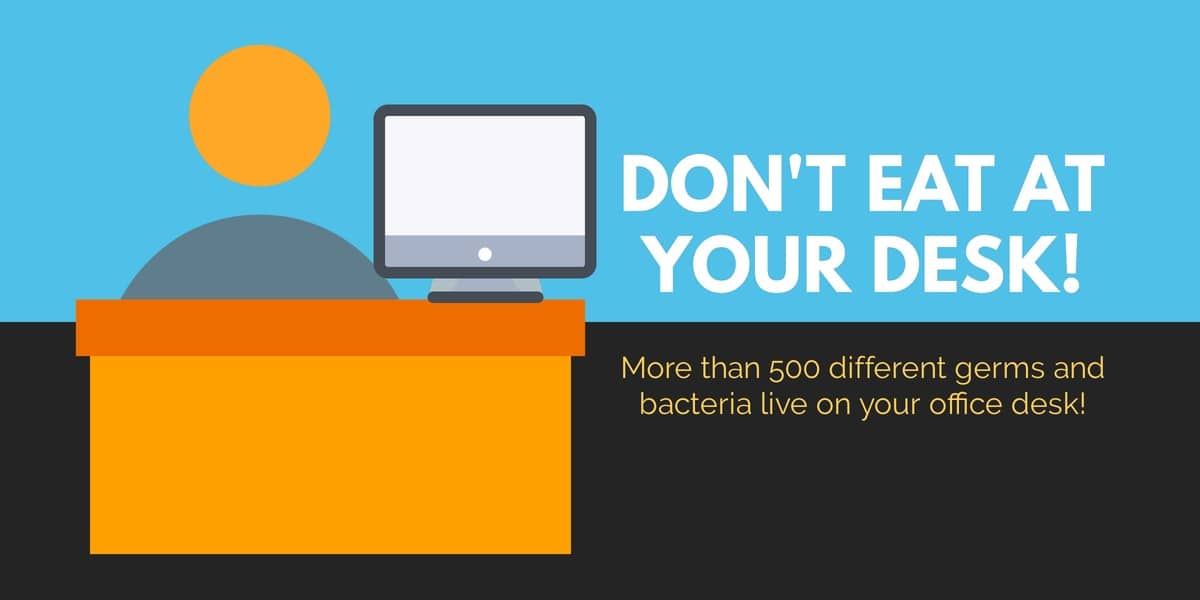Statistically speaking, your office desk and everything on it is teaming with more germs and bacteria per square inch than the office toilet seat, underscoring the importance of regular cleaning and hand hygiene.
Your Office Desk Could Be Dangerous
Before we begin, it's important to keep a few well-documented facts in mind:
- Germs are everywhere.
- The flu can kill you or someone you love, but it's far from the only concern.
- 90% of U.S. workers come into the office knowingly sick.
- Far too many people either don't wash their hands properly after using the restroom, if at all.
- Once you read the rest of this article, you may light your office desk on fire.
There's no polite way of putting it--chances are, your desk and everything on it is covered in more germs than the office toilet seat.
According to research conducted by Dr. Charles Gerba of the University of Arizona;
Office toilet seats had 49 germs per square inch.
But desktops had almost 21,000 germs per square inch.
Phones were worse -- more than 25,000 germs per square inch.
Desks, phones, computer keyboards and mice are key germ transfer points because people touch them so often,
[...] coughing and sneezing can leave behind "a minefield of viruses" that can live on a surface for up to three days.
But what if you're a hygienic and conscientious worker?
According to a recent article by the Deb Group, that may not matter.
[...] e
What Kind of Germs Live on Your Desk?
Of the slightly more than 500 different kinds of germs and bacteria found living on the office desk, many were considered neutral, but several could be life-threatening.
- Pseudomonas aeruginosa - A gram-negative and antibiotic-resistant bacterium commonly found in soil, contaminated water, and your keyboard that can lead to pneumonia in susceptible demographics, such as children, the elderly, or those with compromised immune systems.
- Staphylococcus aureus - Most commonly recognized in its antibiotic-resistant strain--MRSA--Staphylococcus aureus is a gram-positive bacterium that can lead to a host of issues, including respiratory infections and sinusitis, as well as abscess and other skin conditions, including impetigo. In severe cases, the bacteria can lead to complications that result in life-threatening complications, such as meningitis and sepsis.
- E-Coli - The most common cause of diarrhea and gastroenteritis in the world; E-Coli is also responsible for the majority of urinary tract infections. Ingestion can potentially lead to adult kidney failure, bleeding, seizures, and death.
- Salmonella - Also responsible for diarrhea. The CDC estimates salmonella poisoning leads to approximately 1.2 million illnesses, 23,000 hospitalizations, and 450 deaths in the U.S. annually.
- Clostridium difficile - Conventionally referred to as C. diff--another bacteria responsible for diarrhea, fever, dehydration and, in extreme cases, death.
- Norovirus - Conventionally, the flu virus--responsible for the illness and hospitalization of millions, and the deaths of tens of thousands of people each year.
How to Stay Safe at the Office
First, ask yourself these three questions:
- When is the last time you know for a fact your office desk, phone, and computer equipment were cleaned and disinfected?
- Do you eat at your desk?
- Did you wash your hands before eating?
Routine cleaning and disinfection of your office desk, phone, and computer equipment will significantly reduce the chances of acquiring or otherwise ingesting dangerous germs and bacteria.
Additionally, washing your hands before eating (which you shouldn't be doing at your desk--food crumbs are sustenance for bacteria) will reduce the possibility of ingesting germs that you likely picked up touching any number of germ hot spots, including elevator buttons, door handles, vending machines, and coffee pots.
References & Resources
- 90 Percent of Your Employees Come to Work When They're Sick, and It's Your Fault
- The Percentage Of Americans Who Go To Work When They’re Sick
- How To Never Get Sick At Work
- The Majority Of Americans Still Go To Work While Sick [Infographic]
Takeaway
The U.S. labor force takes pride in working hard, even if that compromises their health, and the statistics show that this behavior is not trending downward.
Due in large part to the perceived sanctity of office desks and the fragility of computer equipment, these surfaces are rarely cleaned, let alone disinfected, leading to a buildup of germs and bacteria that severely negatively impact the health, wellness, safety, and productivity of all office occupants.
Partnering with an experienced janitorial provider that understands the need for reliable service technicians who understand the need for corporate security, discreetness, as well as the dangers that lie under that pile of paperwork is mandatory for maintaining a competitive edge in today's market.
Contact us today and discover why Vanguard Cleaning Systems® is the Standard of Clean® for businesses throughout Northwest Arkansas, Missouri, and Oklahoma.
In Oklahoma, dial 918-960-4450
In Arkansas, dial 479-717-2410
In Missouri, dial 417-812-9777


